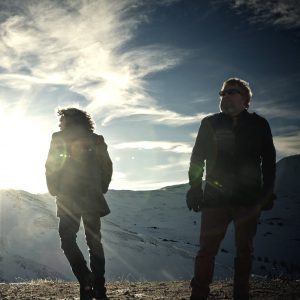Hammock's Everything and Nothing is Echoes May CD of the Month
 It’s difficult to determine when someone has become an icon, but Hammock may be approaching that status as they are one of the artists frequently name-checked by so many ambient, shoegaze guitar bands. There’s a reason why Sigur Rós‘ Jónsi loves them and Ricky Gervais has cited them as one of his favorite bands, which seems surprising to me but probably shouldn’t be. They’re one of our favorite bands too. Raising Your Voice…Trying to Stop an Echo was a CD of the Month 10 years ago, Chasing After Shadows. . . Living with the Ghosts was a CD pick in 2010, Oblivion Hymns in 2012 and Departure Songs in 2014. Continuing that two-year cycle, Everything and Nothing is our pick in 2016.
It’s difficult to determine when someone has become an icon, but Hammock may be approaching that status as they are one of the artists frequently name-checked by so many ambient, shoegaze guitar bands. There’s a reason why Sigur Rós‘ Jónsi loves them and Ricky Gervais has cited them as one of his favorite bands, which seems surprising to me but probably shouldn’t be. They’re one of our favorite bands too. Raising Your Voice…Trying to Stop an Echo was a CD of the Month 10 years ago, Chasing After Shadows. . . Living with the Ghosts was a CD pick in 2010, Oblivion Hymns in 2012 and Departure Songs in 2014. Continuing that two-year cycle, Everything and Nothing is our pick in 2016.
Hammock has developed a sacred ambient music over their last previous two albums. These were explorations of deep processed guitar textures, strings and occasionally choirs that swooped in immersive folds, enveloping you in a world that gave a glimpse of something higher and more divine. As gorgeous as these sounds were, they could also be somewhat oppressive in their unrelenting mournfulness and molten textures. Everything and Nothing moves away from that sound returning to the more rhythmic and melodically inviting approach of Chasing After Shadows. Even the cover is brighter and downright gaudy with its distorted carousel and floating white orbs. It’s playful and ominous at the same time.
“Turn Away and Return” is a perfect title for the opening track. It fades in as if it came off the vapor trail ending of their previous album with floating, but tense textures, a slow build of delayed guitar and cello. But it ends with a playful wordless vocal by Christine Byrd that’s like a gothic chant echoing in a central African jungle. It’s as innocent as Hammock has ever been.
Then the storm hits with “Charity,” a title that belies the pure aggression evinced in this guitar tour de force. With a stuttered 4/4 groove, guitars slam with whiplash punk-rock chords dispersed through delays in a wall of sound assault. You can hear the shoegaze-My Bloody Valentine influence here. It’s the first revelation that this isn’t the slow-mo ambient chamber music dirge of the last few Hammock albums; but a return to a more dynamic and aggressive sound.
 That drive continues on “Burning Down the Fascination” with more rhythmic intensity. It’s a relentless slide down the slopes of sustained guitars and distorted drums sounding a march into the breach. This is the post punk exuberance of Echo and the Bunnymen filtered through doom of MBV. The title track and “We Were So Young,” also harken back to those days of initial inspiration for this band.
That drive continues on “Burning Down the Fascination” with more rhythmic intensity. It’s a relentless slide down the slopes of sustained guitars and distorted drums sounding a march into the breach. This is the post punk exuberance of Echo and the Bunnymen filtered through doom of MBV. The title track and “We Were So Young,” also harken back to those days of initial inspiration for this band.
This rhythmic redemption is accompanied by a return of lyric vocals, which, when it comes to Hammock, means layering another musical texture, only with words. There clearly were concerns the band had that couldn’t be expressed in the more abstracted world of instrumental music and you can hear that on “Dissonance,” a song about addiction sung over a churning guitar groove. Wah-wah vocals merge with wah-wah guitar in a reverb bath. It’s a song of tortured pain that manages to be exhilarating as well.
Laments have always been a deep well for Hammock and they dip into it on “Marathon Boy,” a simple piano driven track inspired by the death of an 8-year old boy in the Boston Marathon bombing. Instead of running, it’s a funereal march of deep sorrow.
“We Could Be Beautiful Again”, a languorous 6/8 waltz full of chiming guitars and strange textures ending with a foreign voice that sounds like it sneaked in on shortwave radio. A lot of Hammock’s music has that effect, a long distance communication from a foreign land, filtered through the skies, seeking communion.
Every album by Hammock seems to be a monumental statement. Back in 2010 I called Raising Your Voice . . . Trying to Stop an Echo, a ‘Gravity’s Rainbow’ of ambient chamber rock.” Everything and Nothingg is a more personal album, the sound of musicians entering middle adulthood with all its attendant doubts and questions, disappointments and loss. With all that, Everything and Nothing is an exultant and spiritual album of 21st century electric guitar classicism.
~John Diliberto
